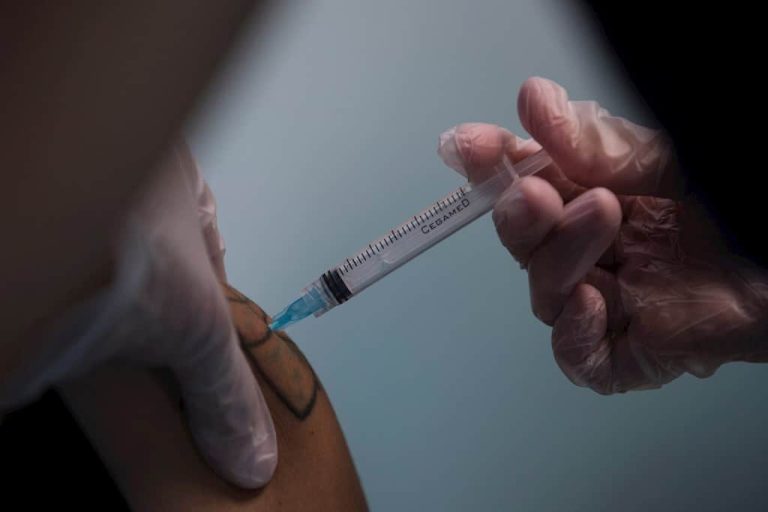29 de julio 2021

Children of Exile: The Births “Sowing Hope” in the Camp of Nicaraguan Farmers

PUBLICIDAD 1M
PUBLICIDAD 4D
PUBLICIDAD 5D
President Carlos Alvarado said they are already looking for vaccine donations and that more details will be forthcoming later in the week

Confidencial | Archive
Costa Rica will vaccinate undocumented people living in the country against Covid-19, assured President Carlos Alvarado on Tuesday, July 27. “There is already a solution being worked on by both the Ministry of Foreign Affairs and the Ministry of Health, to have vaccines available for the undocumented population,” Alvarado said when consulted by local media. However, he did not offer details of how or when the inoculation of this population will begin.
“We hope to finalize it this week to have an answer for that population and have the protection for all inhabitants of our country,” he added. In response to a journalist’s inquiry, he announced that a vaccine donation would be used for this.
Currently, only foreigners with regular migratory status can be vaccinated. That is, temporary or permanent residents, refugee applicants and refugees with up-to-date documents or renewal appointments for their document.
Costa Rica has five million inhabitants of which 10% correspond to the migrant population, most of them of Nicaraguan nationality.
A migratory study in 2017 showed 350,000 Nicaraguans living in the country, “to which should be added the number of irregular immigrants (estimated between 100,000 and 200,000 people),” the document states.
In addition, according to data from the Costa Rican Immigration, from 2018 to July 13, 2021, more than 77,000 Nicaraguan have requested refugee status in the country, as a result of the sociopolitical and economic crisis in Nicaragua caused by state repression.
“The reason is that all inhabitants must be vaccinated: one, for human rights; and two, for the public interest. To the extent that more people are vaccinated, the more the population will be protected and that will be the quickest route for economic recovery,” added Alvarado.
The issue here is the documents problem, but that cannot be a limitation for a human rights issue. The aim is to find a solution, from the Ministry of Health, so that the entire population can register… Part of the problem, when you have people undocumented, (is that) there is nowhere to refer them, but that is not an excuse, we must resolve it. So, we are looking for the bureaucratic mechanism and the doses to be able to do it. It is a solution that is on the way,” said the Costa Rican president.
To date, Costa Rica has applied more than three million doses of Covid-19 vaccines to date, of which 2.3 million correspond to first doses. Along with El Salvador, it leads the rate of immunization in Central America, while Guatemala, Nicaragua and Honduras present a significant lag.
A donation of 500,000 doses from the United States, allowed Costa Rica to accelerate the vaccination campaign since mid-July, when it began to massively vaccinate the population 30 years of age and older. On July 22, 250,000 doses of the Pfizer vaccines arrived, the largest shipment that the country has received so far.
Costa Rican media have highlighted in recent days the need to vaccinate the undocumented migrant population. The newspaper La Nación points out that goal of herd immunity could collapse if these people are not considered. That same media outlet reported a case of a Nicaragua refugee applicant who paid voluntary insurance and still was denied the vaccine. Shortly after, he became severely ill with Covid-19 and had to be hospitalized.
This article was originally published in Spanish in Confidencial and translated by Havana Times
Archivado como:
PUBLICIDAD 3M
Periodista nicaragüense desde 2007, con experiencia en prensa escrita, televisión y medios digitales. Tiene una especialización en producción audiovisual y una maestría en Medios de Comunicación, Estudios de Paz y Conflicto de la Universidad para la Paz de las Naciones Unidas. Fundadora y editora de Nicas Migrantes, proyecto por el cual ganó el Impact Award 2022 del Departamento de Estado de EE. UU. Ha realizado coberturas in situ en Los Ángeles (Estados Unidos), México, El Salvador, Guatemala, Nicaragua y Costa Rica. También ha colaborado con France 24, The Guardian, Al Jazeera, BBC World Service. Ha sido finalista y ganadora de varios premios nacionales e internacionales, entre ellos el Premio Latinoamericano de Periodismo de Investigación Javier Valdez, del Instituto Prensa y Sociedad (IPYS), 2022.
PUBLICIDAD 3D